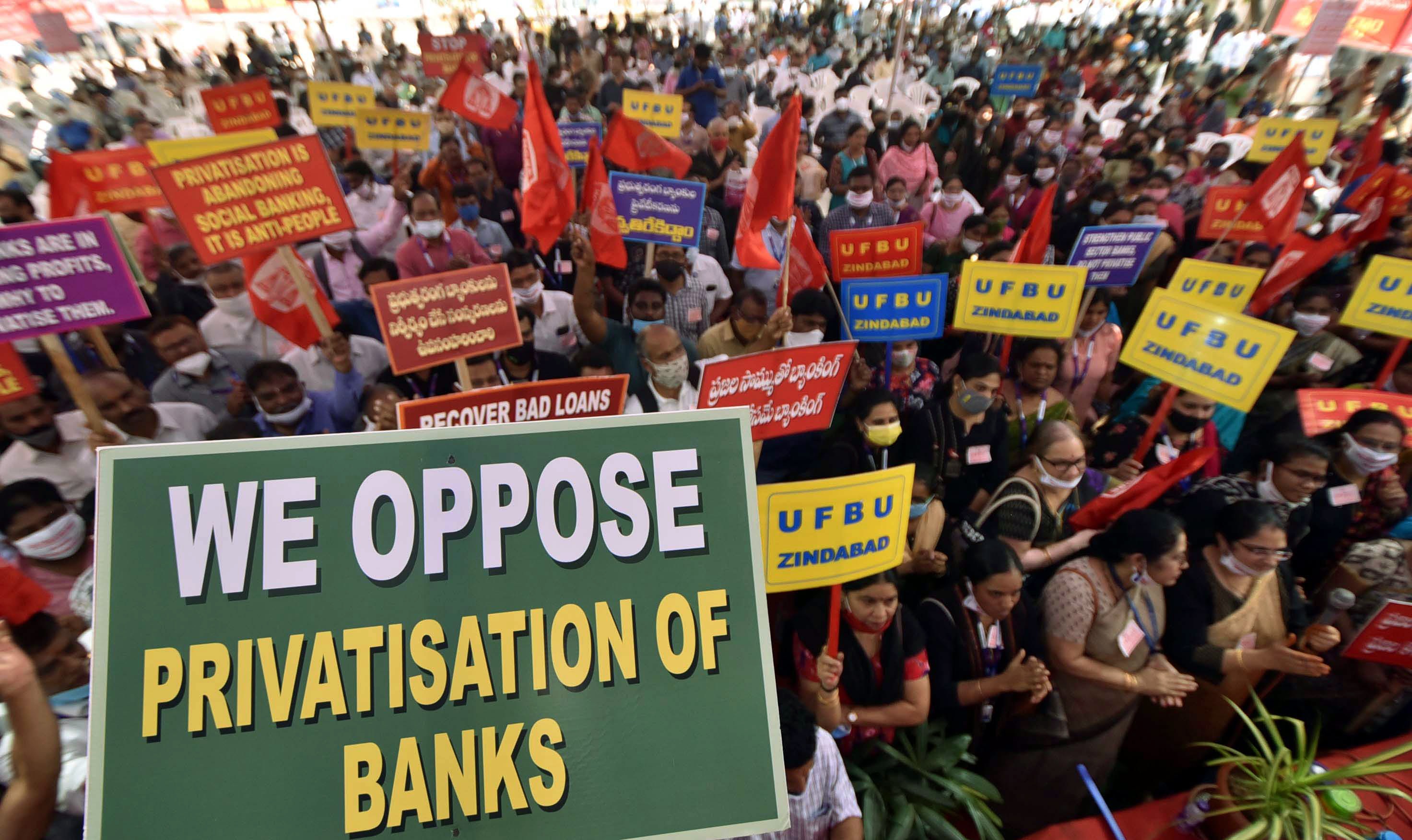Finance Minister Nirmala Sitharaman has said that not all banks will be privatized and wherever it happens, the interest of the employees will be protected.
New Delhi: As many as 10 lakh bank employees participated in a two-day nationwide strike against the government’s plan to privatize two public sector banks as part of its ambitious disinvestment drive to generate Rs 1.75 lakh crore. The nationwide strike was called by the United Forum of Bank Unions (UFBU). UFBU is an umbrella body of nine bank unions, namely All India Bank Officers’ Confederation (AIBOC), All India Bank Employees Association (AIBEA), National Confederation of Bank Employees (NCBE), Bank Employees Federation of India (BEFI), Indian National Bank Employees Federation (INBEF), All India Bank Officers’ Confederation (AIBOC), Indian National Bank Officers’ Congress (INBOC) and National Organisation of Bank Officers (NOBO) and the National Organisation of Bank Workers (NOBW).
The bank unions have also said that if the government proceeds with its decision to privatize the lenders, they will be left with no option but to further intensify their agitation with more prolonged strikes.
Meanwhile, on Tuesday, Finance Minister Nirmala Sitharaman has assured that not all banks will be privatized and wherever it happens, the interest of the employees will be protected. Addressing the media amid a two-day nationwide bank strike called by nine unions against the proposed privatization, she said, “The decision of privatization is a well thought-out decision. We want banks to get more equity… We want banks to meet the aspirations of the country. Those banks which are likely to get privatized, the interest of every staff member will be protected. Interest of existing employees will be protected at all cost.”
Rahul Mishra, General Secretary, We Bankers’ Association, told The Sunday Guardian: “FM Sitharaman’s assurance is shallow. They simply want to pacify the anger of protesting employees. We know very well that the exploitation of employees in the private sector has crossed all limits. Employees in the private sector have to work beyond normal working hours. As per labour law, the maximum working hours should be 8 hours a day. But private companies are forcing employees to work beyond 12-15 hours unofficially. If employees protest, they may be fired. Now after privatization, the government will have no control over those banks. Then who will safeguard the interest of employees?”
Major public sector banks like the State Bank of India (SBI), Canara Bank, and others had already informed their customers that their normal working might be affected at the branches and offices due to the declared nationwide strike, as per reports.
The two-day nationwide strike by the public sector bank (PSB) unions ended on Tuesday, with disruption in services like cash withdrawals, deposits, cheque clearances, remittances, and loan approvals hitting customers. According to reports, the business transactions, as well as government treasury operations, were also affected. However, before going for the strike, conciliation meetings were held with the Additional Chief Labour Commissioner on 4, 9, and 10 March. The UFBU offered to reconsider the strike provided the government reconsidered its decision.
“Even IDBI employees were told that interest of employees will be protected, but soon after privatization, the bank issued a circular stating an employee will be given three chances in rating and if failed, they will be sacked. On paper, it seems fair enough, but if you ask that bank’s employees, they will tell you no-one knows how ratings are arrived at. Guys who were getting excellent and very good ratings are suddenly getting the worst rating,” an IDBI employee told The Sunday Guardian requesting anonymity.
“Privatization of PSBs will put financial inclusion in reverse gear. If Jandhan ACs, DBT, Insurance (PMJJY, PMSBY) and pension (APY) schemes were good steps of Modi 1.0, privatization will kill all such social schemes in Modi 2.0 as being a private entity, banks will focus only on profit motive; not on social charity for first-time banking customers. 90% of such schemes are being run by PSBs only. Public banks are market creators, while private entities enter into that market space when there is something to be harvested. Currently, the PM Svanidhi scheme is a prime example of it. 98% of loans are given by PSBs to small street vendors who never knew anything about lending, but are doing business on a small scale now. So, small scale businesses and our growth will be affected by privatization of PSBs,” another bank employee said on the condition of anonymity.
According to the bank unions, the PSBs are earning operating profits and there is no need for privatization. As of March 2020, these banks earned a total profit of Rs 1,74,000 crore.
However, since the banks provided Rs 2,00,000 crore for bad loans, there was a net loss of Rs 26,000 crore, as per reports.
In her Union Budget speech for 2021-22, Finance Minister Nirmala Sitharaman said that the government will privatize two more public sector banks. The government has already privatized IDBI Bank by selling its majority stake to LIC in 2019 and has merged 14 public sector banks in the last four years.

